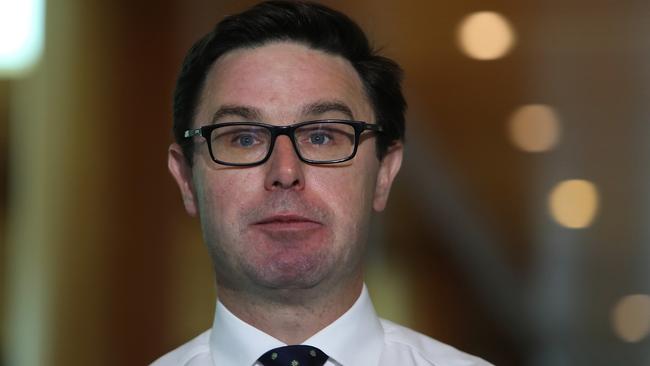Littleproud hoses down Joyce in water fight
David Littleproud has hit out at Barnaby Joyce and crossbenchers who promote the 1930s-era Bradfield scheme.

Water Resources Minister David Littleproud has hit out at Barnaby Joyce and crossbenchers who promote the 1930s-era Bradfield scheme to turn northern rivers south, saying that they do a disservice to water infrastructure development.
He said while the Bradfield scheme had been “discredited” decades ago, there were real projects for new dams that were being resisted by the states on irrational ideological grounds.
Mr Joyce tweeted earlier this year that Bradfield was “the one thing we can do to drive a solution to reduce the effects of drought”.
Mr Littleproud disagrees. “Those that want to solely support the Bradfield scheme actually do no benefit to the cause of water infrastructure,” he said. “We should use the smarts of the 21st century, not 1938 technology.”
Mr Littleproud also warned states that unless they agreed to proceed with a plan to free up another 450 billion litres for environmental flows in the Murray-Darling river system through relatively painless “efficiencies”, in 2023 the federal government would be forced under law to resume the practice of buying back water licences from farmers.
He made his remarks at a press conference yesterday where he said he would push at a meeting of state water ministers on Sunday for an inspector-general to oversee the Murray-Darling Basin Plan. “This is a new tough cop on the beat across the Murray-Darling, with the powers needed to ensure integrity in delivery of the Basin Plan,” he said.
The severe drought gripping large parts of eastern Australia has led several politicians, including crossbenchers Pauline Hanson and Bob Katter, to revive the gigantic proposal put up by Queensland-born civil engineer John Bradfield in 1938. That scheme, never acted on after a government review found it to be impractical, would channel waters from the rivers of northern Queensland south, and in one version into the Murray-Darling, via a network of dams, hydro-electric plants, tunnels, pipes and pumps.
Mr Littleproud, however, said: “We should not be holding on to something that … was discredited — we should be looking for iterations of it.”



